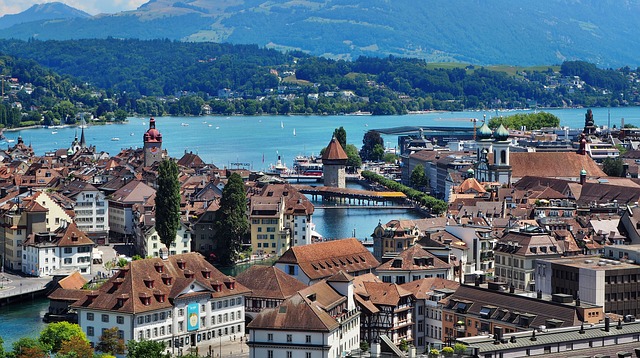- Water tests
- Air and pollutants analysis
- Mold analyses
- Asbestos analyses
- Rapid tests
-
Knowledge
- Weitere News
- Analysis made easy
- Facts About Drinking Water
- Facts about Indoor Air
- Facts about Mold
- Facts about Asbestos
-
Water quality in Switzerland
- Further current news
- Water Scarcity and Water Quality
- Drinking Water in Switzerland
- Tap Water in Switzerland: Quality and Controls
- Drinking Fountains in Switzerland
- Water Quality - Canton Basel
- Water Quality - Canton Bern
- Water Quality - Canton Geneva
- Water Quality - Canton Zurich
- NEWS: Zurich Drinking Water Map
- Water Quality - City of Baden
- Water Quality - City of Bern
- Water Quality - City of Zurich
- Water Analysis - City Lucerne
- Water Quality - City of Winterthur
- The Water Supply of the City of Thun
- Initiative for Clean Drinking Water
- Partnership with WATER FOR WATER (WfW)
- Help & Services
 Water Analysis in Lucerne
Water Analysis in Lucerne
Drinking water is our most important food resource, used not only to quench thirst but also for food preparation. Additionally, a large amount of water is consumed for hygiene and the production of many goods. To underline the importance of clean water as a valuable resource, March 22 has been declared World Water Day by the United Nations (UN). While Switzerland has abundant and high-quality water resources, 748 million people worldwide lack access to water of drinking quality.
Continuous Quality Assurance Guarantees Excellent Quality
To ensure this remains the case, the water is continuously monitored in real-time by a variety of sensors. Additionally, about 2,200 drinking water samples are taken annually at various locations in the EWL supply area (Energie Wasser Luzern). The quality of the samples is checked by the Food Control and Consumer Protection of Lucerne.
Lucerne Water, a Healthy Delight
- The water treatment process and drinking water are continuously monitored at 100 locations.
- The EWL network control center monitors all water supply systems 24/7.
- Even if one of the three sources (groundwater, lake water, and spring water) fails, the full supply security for the population of Lucerne is guaranteed.
- Besides the water supply network used in Lucerne, the city also has the Lucerne fountain network. This network dates back to the Middle Ages and is mainly fed by springs at the foot of Mount Pilatus. Thus, if there is ever a total power outage in Lucerne, the city can still supply its residents with good drinking water thanks to the fountain network.
The Composition of Drinking Water in Lucerne
★ The drinking water in Lucerne comes from the springs on the northern slope of Mount Pilatus, Lake Lucerne, and the groundwater of the Kleine Emme.
As far as the water is concerned, it meets the highest quality standards. The water hardness in Lucerne is mostly moderately hard (between 15 and 25 °fH) in most city areas. Knowing this value is important so that everyone, depending on their district, can dose their washing machine detergent accurately and in an environmentally friendly manner.
Water Hardness and Origin Determine the Taste of Tap Water
In nature, water flows over gravel and stones into the ground, where it absorbs many valuable minerals. These include magnesium and lime (calcium carbonate). The lime content determines the water hardness, measured in °fH. These substances and minerals also give the water its taste and make it valuable for our bodies.
Since the water in the city of Lucerne mainly comes from lake and spring water, it has different hardness levels depending on its source. When spring discharge decreases, peak consumption can also be covered by groundwater. The hardness of this mixed water is then between 15 to 20 °fH.
Water Analysis in Lucerne for Those Who Want to Know Exactly
EWL has published a map of the Lucerne city area, which shows exactly which neighborhood is supplied with which type of water.
- Depending on whether it is lake water,
- mixed water (lake and spring water),
- spring water, or from the
- Kriens or Littauer Berg water supply, its composition and water hardness vary.
Lake water is the softest, with 11 °fH. The average chemical values of the Lucerne water analysis show the composition of the water in each neighborhood, including the content of magnesium, calcium, sodium, potassium, etc.
What Water Quality Comes from Your Tap?
Although the water quality in Lucerne is very high, water suppliers guarantee drinking water quality only up to your house connection. Old, dirty plumbing systems and fittings can release heavy metals such as lead, nickel, iron, copper, zinc, etc., into the drinking water through corrosion.
However, this can also be checked by purchasing appropriate water test kits. Then you know exactly what you are drinking and cooking with every day.
Sources:
✔ 12 common pharmaceuticals
✔ e.g., diclofenac, ibuprofen
✔ 20 common PFAS chemicals
✔ Per- and polyfluorinated alkyl substances
✔ Heavy metals and pollutants
✔ For general drinking water, softeners
✔ Most common pesticides
✔ Glyphosate separate analysis
✔ Commonly used pesticide
✔ Possibly carcinogenic
✔ E. coli, coliform bacteria
✔ Enterococci
✔ Risk of transmission during showering
✔ Causes Legionnaires' disease
✔ Focus on bacterial contamination
✔ For general drinking water, softeners
✔ Heavy metals and contaminants
✔ Bacteria analysis additionally recommended
✔ Most common contaminants
✔ Separate bacteria analysis
✔ Analysis for lead also included
✔ Bacteria analysis additionally recommended






